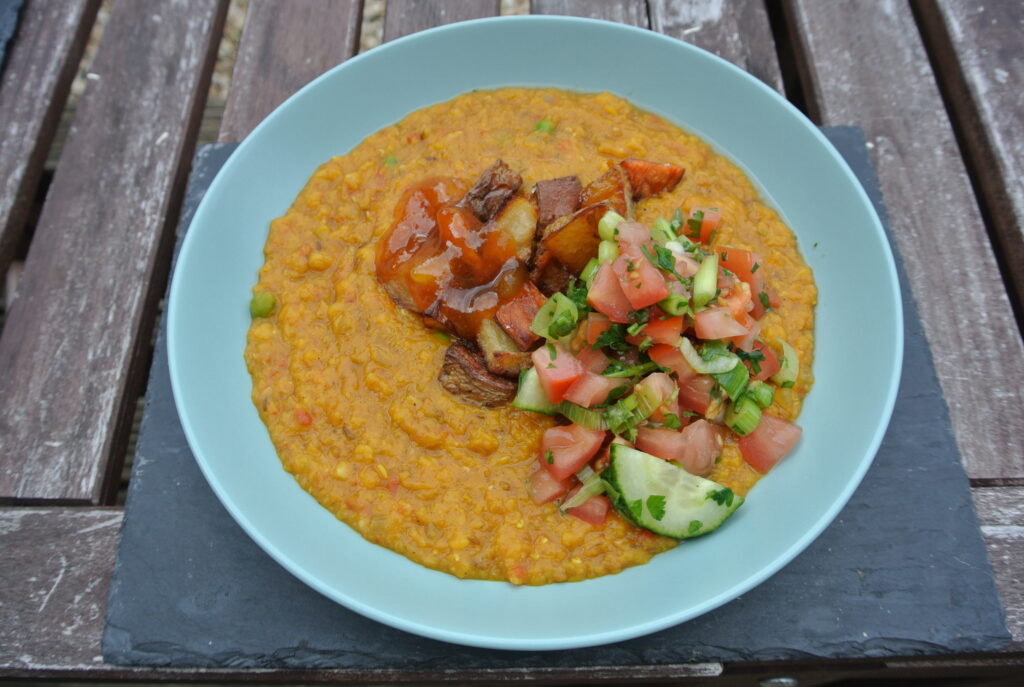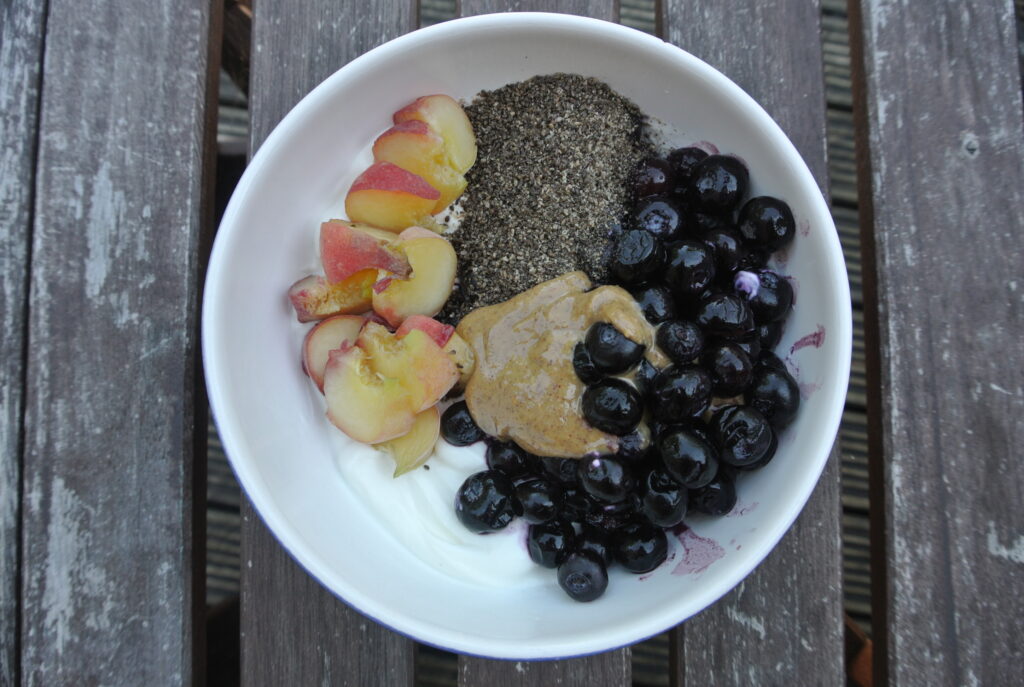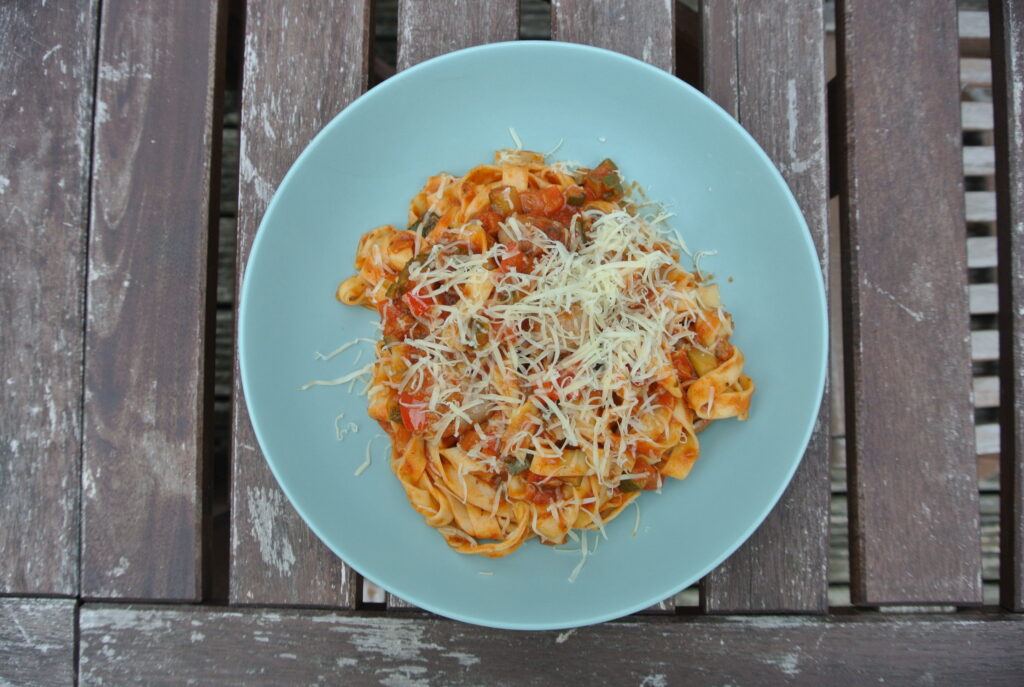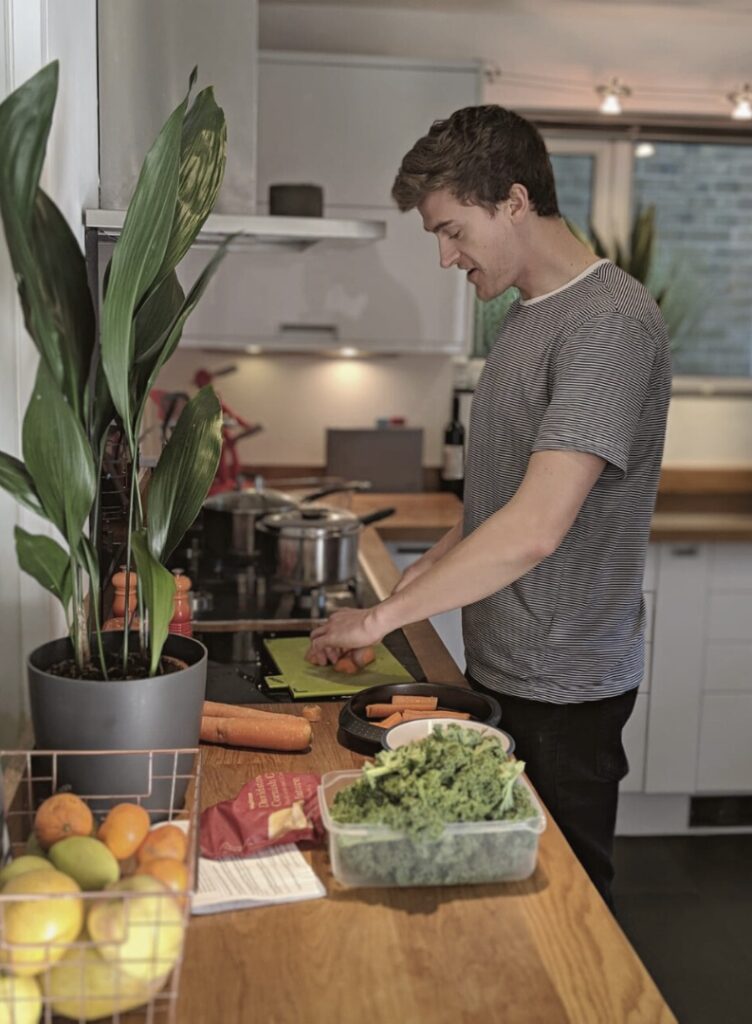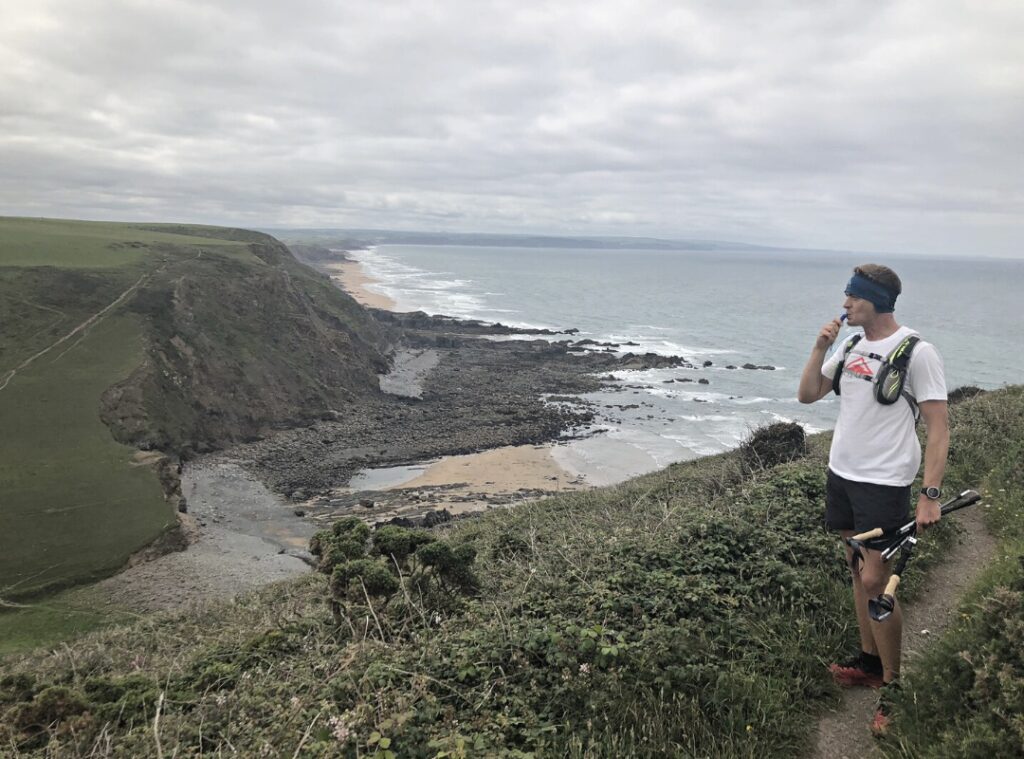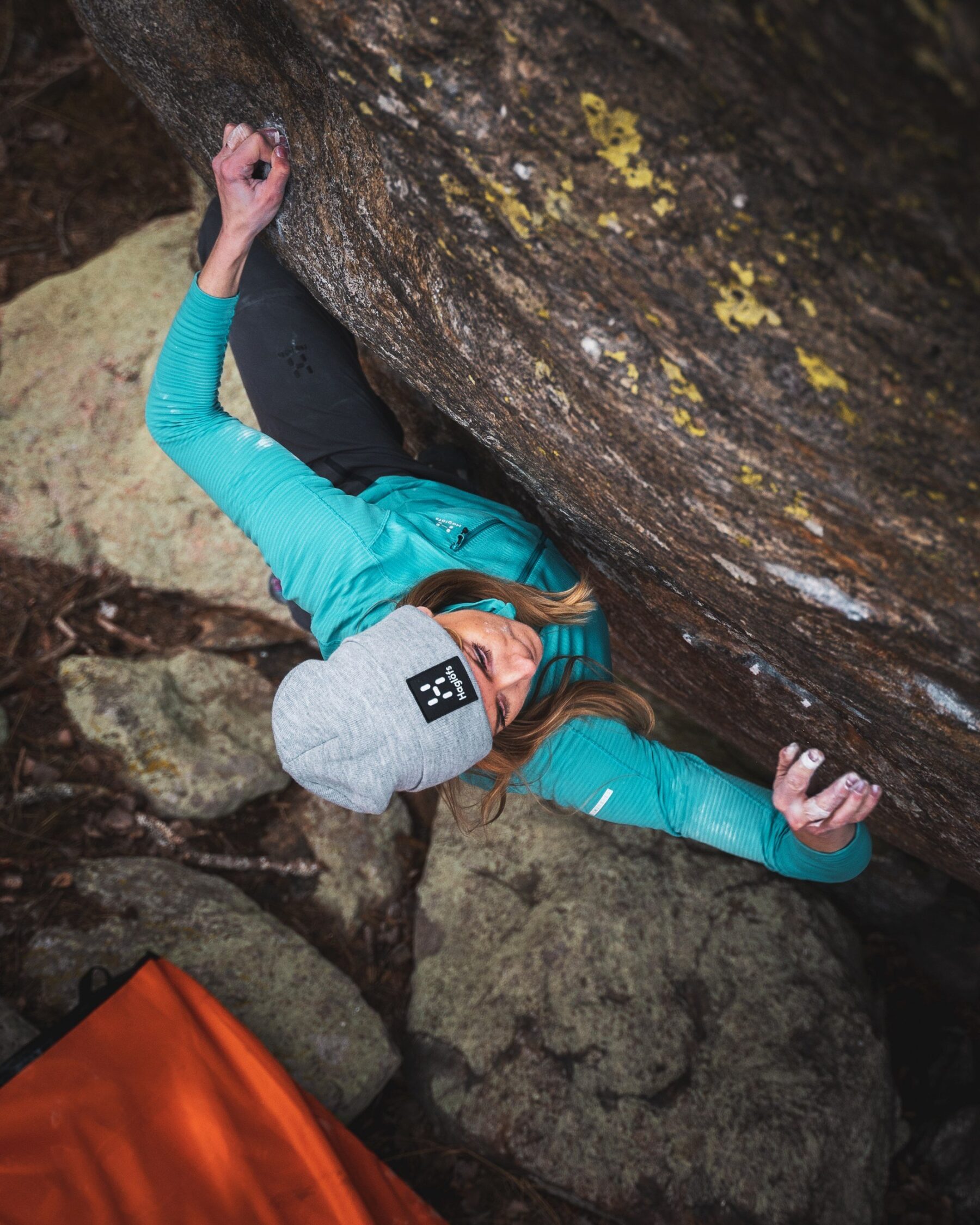Home Story Adventures in Nourishment
Adventures in Nourishment
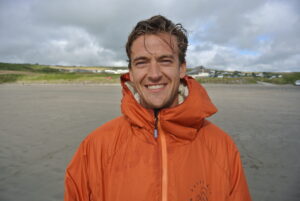
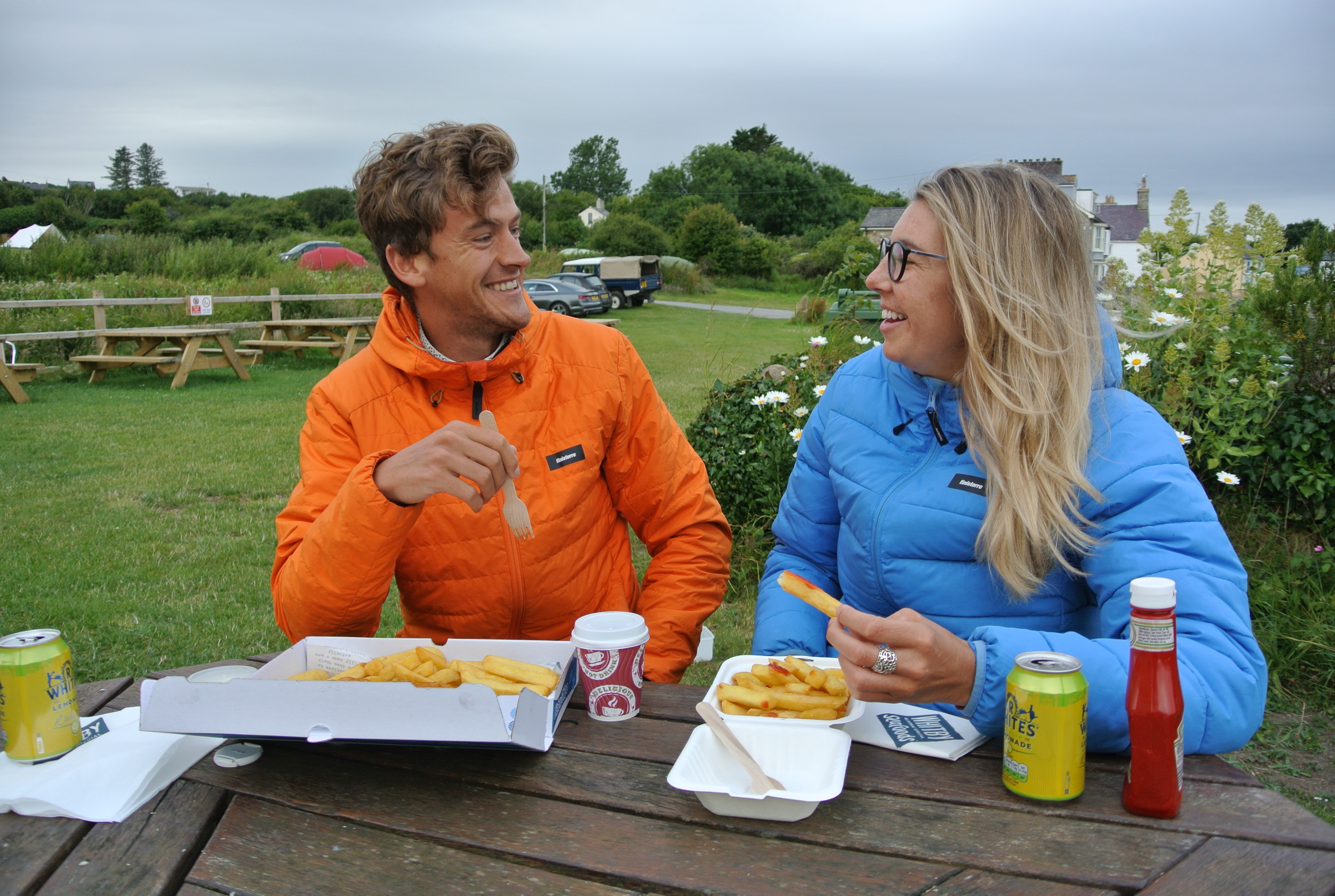
Robbie and his partner Lucy, enjoying some local Friday night fish and chips in Newport, Pembrokeshire.
Navigating the world of diet and nutrition is not easy. I often compare it to a fell race in the Lakes or North Yorkshire Moors in the middle of winter. You start full of enthusiasm and confidence; you look ahead to find your potential route; you know exactly where you’re going and won’t be deterred by anyone or anything. You think I’ve got this; I know what I’m doing.
Then, the wind starts to chill your bones; the cloud sets in and distorts your vision; the path you’d laid out has become blurred, almost like you’ve found yourself in an entirely different county, and you’re not even sure you’re in the same race that you started two hours ago. Suddenly, movement. A group of fellow runners dart off into the mist to your right; you drop all preconceptions about your direction and ability to find your way and follow. You’re not sure if they know where they’re going, but they seem confident; they don’t even need to look at their maps; they’re selling it well, aren’t they?
At first, it feels good. You’re working together, bouncing through the scree as if in a playground, your heart pumping you full of adrenaline and a feeling of connection that you’re in this together, a fellowship; this can’t possibly go wrong. They know what they’re doing. Suddenly, the group leader – brawn like a marine and a face that Brad Pitt would envy – brakes at full pelt, stopping before dropping into the abyss. Where are we? Of course, you have no idea – you were following them. The confidence they showed in their ability trumped yours; it felt good to be a part of something bigger, a collective effort, all for one and one for all, but now you’re stuck on the edge of a cliff in ten-metre visibility, wondering where it all went wrong. Should I have followed them? Why didn’t I back myself? What if I had stopped to think and analyse the situation before making such a rash decision?
This is a similar trap people fall into with their relationship with food. Dogma and conjecture outweigh science and rational thought, and the desire to be a part of a group outweighs the voice of reason. You’ve probably heard it all before: The vegan diet will reverse heart disease. Bacon gives you cancer. Red meat gives you diabetes. Red wine will help you live until 110. These grandiose headlines are said with such conviction that they blur the lines of truth, like the mist rising over Helvellyn ridge blocking all possible alternative routes from view. People are often willing to drop all their judgment to demonise foods to the point of self-harm.
Any black and white rhetoric around food and nutrition should be viewed with the utmost scepticism.
Any black and white rhetoric around food and nutrition should be viewed with the utmost scepticism. The truth is, it’s not black and white; it’s grey. We were once told to avoid saturated fat like the plague to avoid developing heart disease, and an entire generation avoided spreading butter on their toast for fear of death from a sudden cardiac arrest. We then realised that the French have the highest intake of saturated fat in Europe, with the lowest rates of heart disease – it became possible that it wasn’t the saturated fat per se, but rather how you consumed it, where it was sourced from, and what it was paired with. Context matters. Every nutrient exists on what is known as a bell-shaped curve in how it will impact our physical and psychological health. Too little, probably not a good thing; too much, probably not a good thing; somewhere in the middle – perfect.
The difficulty comes with the individual variation in human physiology. Our bell-shaped curves with foods and nutrients will vary from person to person. While I might be able to enjoy higher levels of sugar before it affects my health negatively, you might find yourself raiding the cupboards when that sweet nectar melts onto your tongue and the dopamine swells in your brain, screaming for more.
The most important thing to remember is that this is OK; this is normal, and you shouldn’t feel guilty about your experiences. Our requirements and relationship with food are a part of our identity. It’s what makes us unique. As adventurers and lovers of the outdoors, we have an innate desire to explore, challenge ourselves, and seek new information and opportunities. We should channel this in the right way to learn to love all food, in all forms, without judgment.
So, the next time you find yourself in the clouds, disorientated and bombarded with information from others blurring the lines of truth. Pause, don’t judge, but remember, you don’t need to follow them into the abyss. Developing a more positive experience with food and finding the right balance for our lifestyles and preferences, much like we’d approach a new mountain range or swell, starts with tuning into our core values as adventurers and looking at food with an open, curious, and explorative mind.
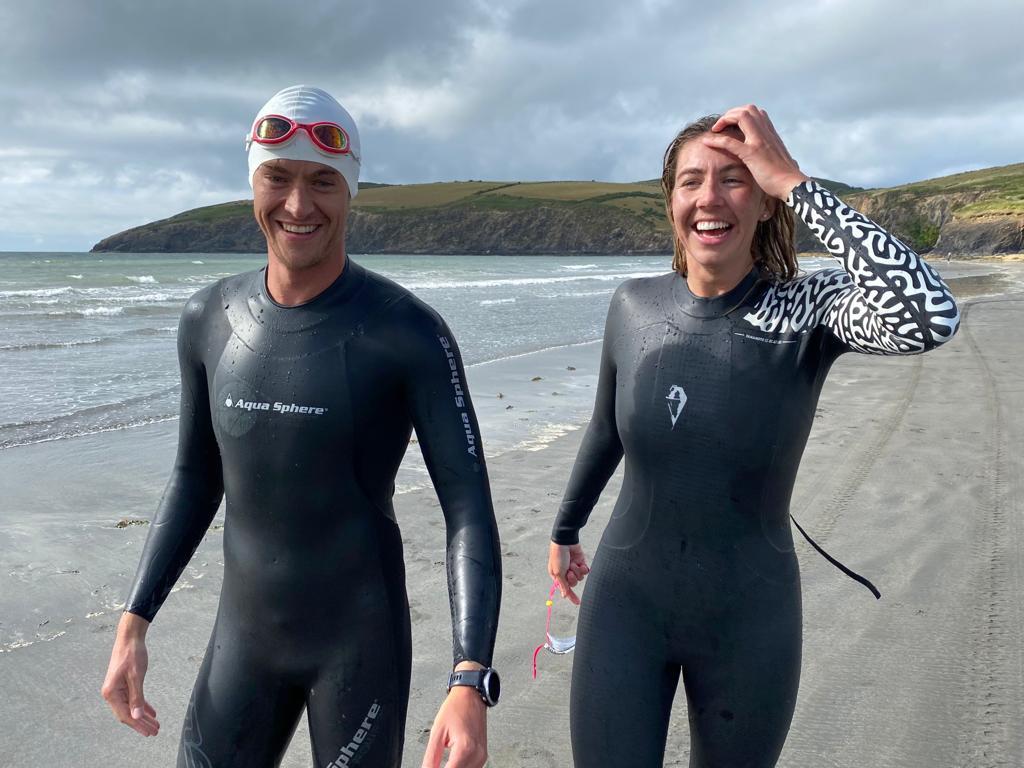
Robbie and Lucy on Newport beach, Pembrokeshire before heading out into the sea for a swim.
So where do we go from here?
There’s so much to dive into in terms of the psychology of eating habits and how to build a positive relationship with food. For now, I’ve listed a few areas to explore that may help to develop a better understanding of food and nutrition. While many of you reading this will no doubt already be maintaining a strong and healthy relationship with food and nutrition, for some of people, hopefully this will help kickstart a new way of thinking that is fundamentally more balanced and beneficial for your health.
What are your motivations for eating the way you do?
Our eating and dietary preferences should be a very personal experience. But as I’ve alluded to above, too many people are following a crowd and eating in a way they think is right for them, purely based on external influences. This could be avoiding sugar entirely because one of your friends told you it was ‘toxic’. Or cutting back on the carbs because ‘they give you cellulite’.
But what if your current approach is doing you harm? What if you don’t enjoy it? What if it’s not true to your internal values?
Reflect on how you eat and your choices now; you might be surprised by how many of them have come from external influences. Awareness of our potential barriers can allow us to open doors to alternative approaches.
Keep it simple: nutrition doesn’t have to be complicated
Research suggests that the primary determinant of a healthy diet is one that’s predominantly made up of whole and minimally processed foods. Whole foods include meat, fish, vegetables, fruit, nuts, and legumes. While minimally processed foods include cheese, yoghurt, and baked beans.
This doesn’t mean perfection. We can still choose to enjoy some ultra-processed foods when we want to; it’s about striking a balance between enjoyment and health.
To achieve this, we need to step back and reflect on what supports our ability to eat in this way? Two habits will help:
> Meal planning with a shopping list
> Cooking
I know it sounds simple. But simple solutions can be the most effective, and if we can get back into our traditions of cooking fresh, local, seasonal food – we’ll likely be doing our health – and the health of our planet – a world of good.
Choose who you follow wisely: social media is a minefield
A lot of nutrition misinformation is driven by online health and diet ‘gurus‘ who make a living on taking advantage of our susceptibility to emotionally charged information and our desire to seek the path of least resistance.
Here are a few red flags to look out for that should tell you whether someone is a reliable source of information or not:
> They’re not a registered dietitian or nutritionist
The internet is awash with ‘nutrition coaches’, ‘health and wellbeing experts’, and doctors with a newfound interest in diet and nutrition who, unfortunately, lack the education in nutrition to evaluate and critique the science effectively.
> They promise a quick fix
Being healthy comes easy to some people, but it’s hard work for most of us. It takes a thorough understanding of your physiological and psychological drivers to eat, move, and perform habits that bring us fulfilment and joy.
Going on a juice cleanse or doing a tea detox may help you lose weight in the short term. You might even feel great for a short while. But what would they teach you about how to live a life of purpose, fulfilment, and one that inherently makes you a healthier and happier person?
> They exaggerate the impact of individual foods or nutrients
Cherries will cut your heart disease risk in half. Flaxseeds will make your skin glow. Apple cider vinegar will cure your diabetes. Many of these statements have aspects of truth in them. For example, studies have shown that drinking vinegar after a meal can lower your blood sugar response. But this individual mechanism will not overhaul a lifetime of poor dietary and psychological habits, and no single food will be the elixir for our health problems.
Our health is determined by our overall diet, lifestyle, and psychological and social well-being. To isolate one food as a ‘superfood’ or a ‘cure’ misses the point entirely. This isn’t to say you shouldn’t try new foods and experiment with alternative solutions to a problem you might be trying to solve – but try not to miss the forest for the trees.
And Finally: DON’T BELIEVE THE HYPE (OR THE HEADLINES)
Nutrition science is a challenging area to study, and journalists often jump at the chance to write sensationalist headlines based on studies that have rarely shown what the newspapers will claim.
For example, a recent headline read Glass of red wine a day cuts bowel cancer risk. This was based on studies that tracked participants’ diets over 5-10 years, in what is known as an observational study. They found that people who consumed an average of one glass of red wine a day, compared to those who didn’t, have lower rates of bowel cancer. Done deal. It’s clearly the red wine having a specific effect on the functionality of our bowels that’s preventing cancerous cells from migrating and spreading. Pass the Merlot, would you?
Not quite. Perhaps the individuals that drink more red wine are wealthier? Wealthy individuals tend to enjoy better education, exercise more, have less stress, have better access to fresh food, and are, by and large, healthier than individuals from lower socioeconomic backgrounds. Maybe it’s not that red wine reduces your risk of cancer. Perhaps it’s simply that people who drink red wine tend to be wealthier and healthier and, therefore, have a lower risk of developing bowel cancer.
The bottom line? Journalists and editors have got to sell newspapers, not educate you on the complex issue of health and nutrition. So, the next time you hear a sensationalist headline stating that red wine cures cancer or caffeine cuts your Alzheimer’s risk in half, know that probably, likely, most assuredly, it’s complete and utter nonsense.
Don’t miss a single adventure
Sign up to our free newsletter and get a weekly BASE hit to your inbox
Other posts by this author
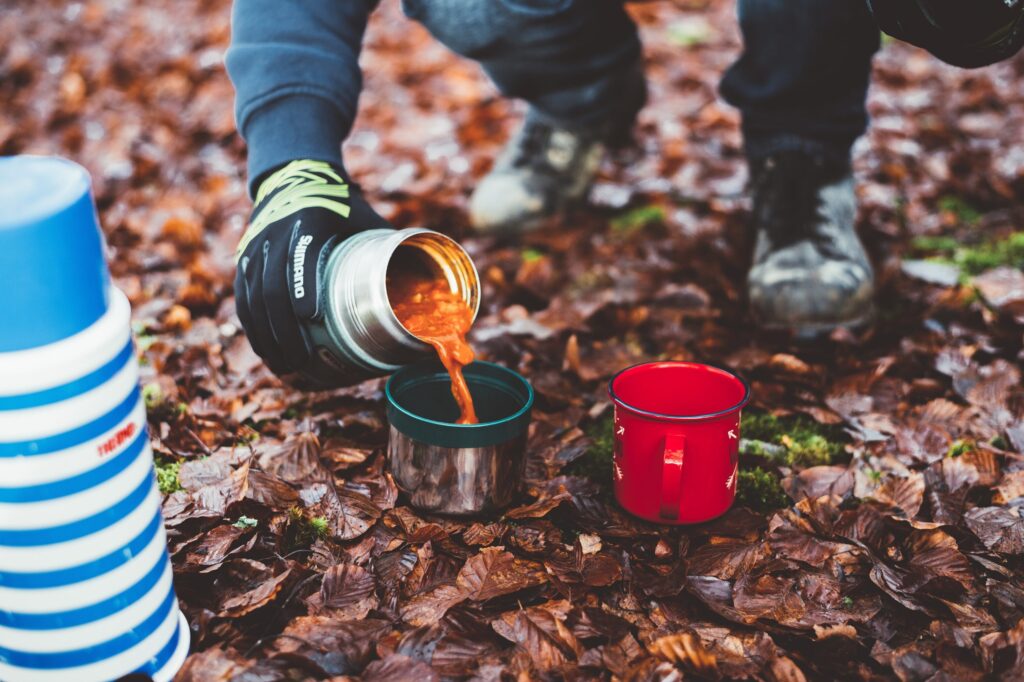
Story • Robbie Puddick • Feb 21, 2023
The Evolution Of Nutrition
A deep-dive into our primal relationships with food, fuelling for adventure and the reasons why we eat
